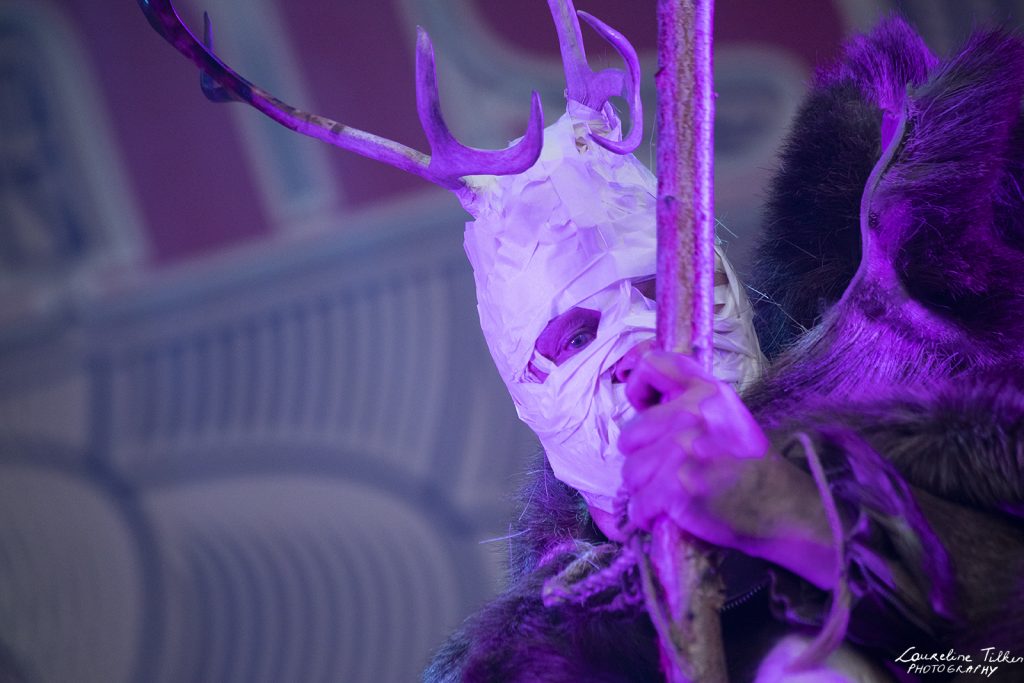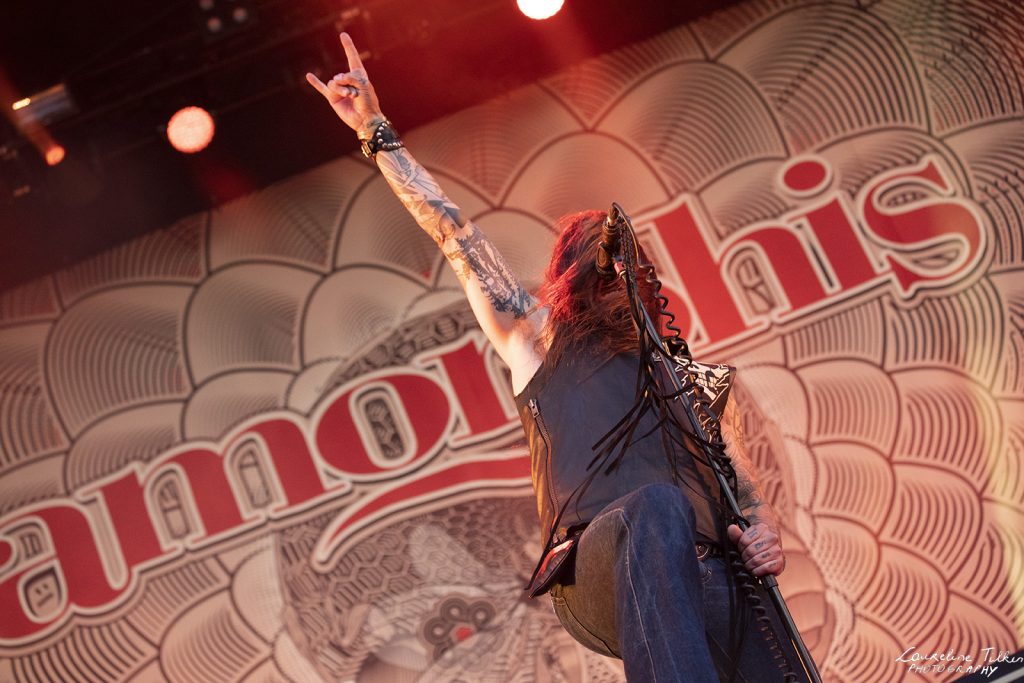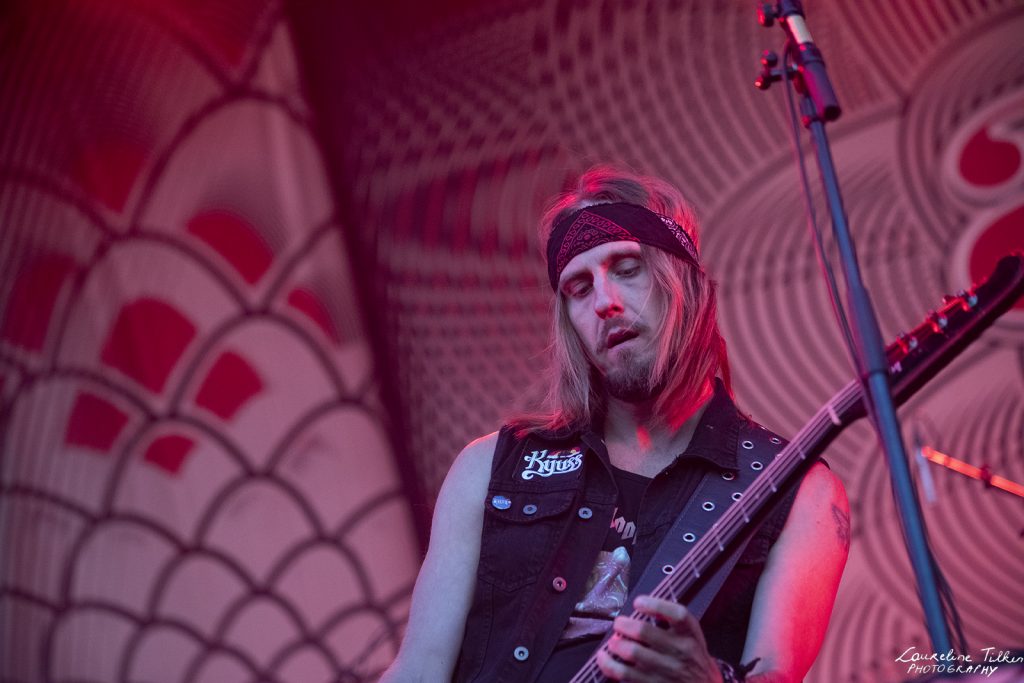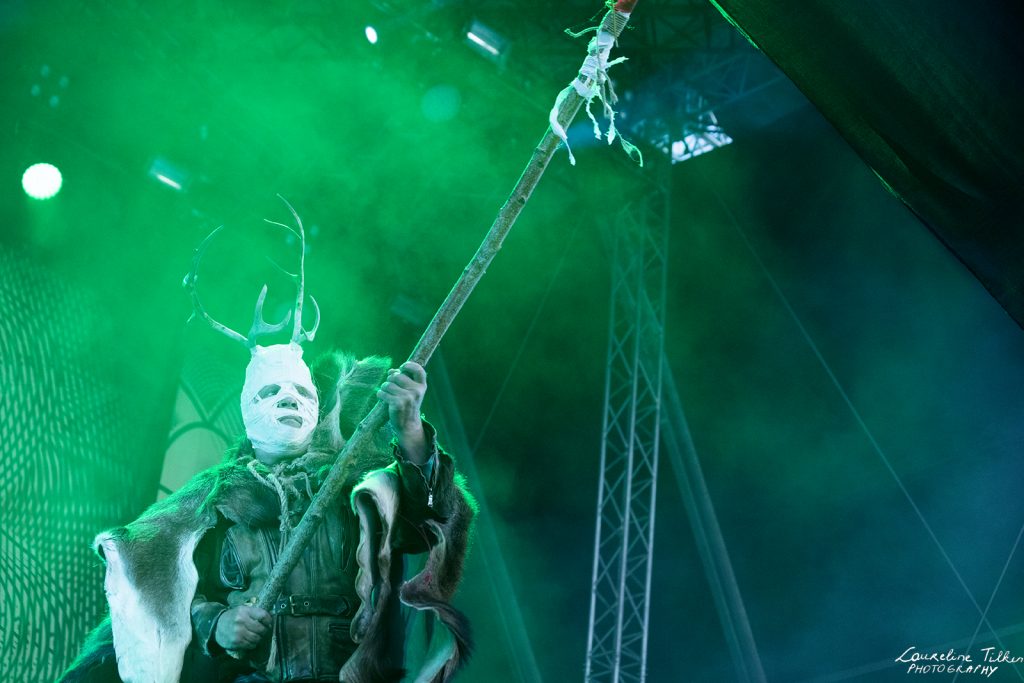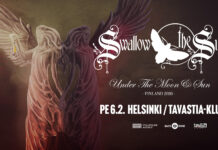Guest contribution by Jasmin Hammon

Pekka Kainulainen at Tuska © Laureline Tilkin Photography
„If you write him a letter, he sure will be glad to help you“ – this has been what Esa Holopainen recommended me to do when I met him for an interview in February in Lyon, France. We were talking about the influences of oriental music on the songs of AMORPHIS and when it came to the lyrics, Esa suggested that it would be more fruitful for me to meet the person behind.
Since the album Silent Waters (2007), AMORPHIS cooperate with the poet and artist Pekka Kainulainen who writes a big part of their lyrics ever since. Well, I did what Esa told me and wrote a letter to Pekka, in analog form, pen on paper, explaining my research project about oriental metal. I decided to work on this subject to question myself where my own fascination for the Orient comes from.
My sister and I have been born in the Eastern part of Germany before the fall of the Berlin Wall and we got used to the music of the Middle East and the Arab world very early, as our mother was always dreaming of traveling the world. I guess this is the reason why I got a Persian name…
During her studies, she met fellow students from Afghanistan and other communist countries. This is how she fell for the beauty of the oriental music and dances, a love she passed on to her daughters, that is how my sister and I started to learn belly dance (Raqs Sharqi, actually) at the early age of 8, but we also were curious to learn from all kinds of music and dance cultures.
At the age of 9, we started to perform medieval and folkloric dances and Raqs Sharqi on medieval festivals all over Germany, for bands like SPILWUT, TRITONUS, CORVUS CORAX and IN EXTREMO (I am not sure if they already used this name at the time, it’s so long ago) who eventually turned into rock and metal bands. Years later, I became a metalhead and discovered NIGHTWISH, EPICA, AFTER FOREVER, WITHIN TEMPTATION and since the AMORPHIS – ARCH ENEMY – NIGHTWISH show in November 2015 in Toulouse, I became a die-hard AMORPHIS fan.

Jasmin Hammon
A few years later, something struck me at a concert in Munich, where the Tunisian band MYRATH and the Dutch band EPICA shared the stage. Never before I realized how present the oriental musical elements are in European metal, as I am so familiar with the „exotic“.
How many similarities but also differences there are between the „oriental metal“ that comes from Europe and the bands who are originally from the Orient! I also understood that night that the notion of „the Orient“ is a highly questionable one.
Where exactly is the Orient? Is it the Middle East including the Arabian Peninsula (how Germans perceive the Orient normally)? Is it North Africa, the Maghreb (which French people would consider as oriental)? Is it India or even the Far East, like Indonesia, China, even Japan (as it is seen by the Anglo-Saxon world)?
I began to realize that this question is linked to the colonial times and therefore a subject that has a certain political and social weight! The whole matter of superiority and inferiority, economically, politically, socially, culturally, the asymmetrical relationship between European countries, the ancient colonial powers, and the „oriental“ countries, which had been the pawns in this game for centuries. A whole dimension of post-colonial and transcultural studies could hence be opened up when you treat the question of „oriental metal“.
There is indeed scientific research nowadays, like Stefano Barone who presented his paper about how the metal subculture was implied in the Arab Spring in Tunisia (see Metal Identities in Tunisia: Locality, Islam, Revolution) at the Modern Heavy Metal Conference in 2015 at the Aalto University of Espoo.
At this year’s conference, there had already been three presentations, including mine, about oriental metal (see the work from Ilgin Ayik, Fulya Çelikel)! Another important work is Exotische Welten, Europäische Phantasien, published in 1987 (my year of birth!) in Stuttgart. In this collection of essays, the different authors explain the complex relationships between Europe and the Orient(s) and how this influenced all kinds of arts on both sides during the centuries. Don’t forget the outstanding study Orientalism (1978) by Edward Said! He clearly shows, how the Western civilizations have constructed the „Orient“ for political reasons and how this has shaped the image of the oriental cultures.
The more I looked into the creation of the „exotic“ and the „Orient“, the more I learned how important the role of „oriental metal“ is in the course of history. But I knew from the beginning, that my research project should also be about getting the musicians to have the chance to speak for themselves.
Only they can tell us about their motivation to mix European metal and rock with the folkloric music of their home countries. For this project, I already discussed with Chen Balbus from ORPHANED LAND and Esa Holopainen from AMORPHIS (Hardline Magazin N°42). The interviews with Tuomas Holopainen and Floor Jansen (about their songwriting for NIGHTWISH, resp. AFTER FOREVER and REVAMP) will be published in Hardline Magazin‘s issue N°43, too. I also got the chance to meet Tomer Pink and Davidavi „Vidi“ Dolev in April 2019 in Lyon. Their illuminating ideas can be found here.
A few weeks after I sent my letter, I finally got a positive answer from Pekka and his suggestion to see us during the Tuska Festival. We met somewhere near the main stage (I was surprised about his face memory, as he easily found me in the middle of the crowd) and sat down on the skate park of the festival area, in the golden evening sun, and this is what we have been discussing:
Jasmin: Actually, I just came back from the Modern Heavy Metal Conference at Aalto University in Espoo, which is organized by Toni-Matti Karjalainen and his team. We were discussing this trend of referring to the Kalevala in the lyrics of metal songs. And we wondered if other contemporary Finnish poets who are not linked to a band also refer to the mythology. Do you have any news about that? Are there contemporary Finnish poets who use subjects of the Kalevala or other Nordic mythologies?
Pekka: I believe that it mainly belongs to that kind of music, metal. I’m not sure if it is a trend. I’m an artist, but I … I don’t know why there is this trend. I don’t know much about other artist’s work. I have no time to visit exhibitions and I have no time to read poems. [laughs] No, that’s not true. Now I realize something, I’m a multi-artist and maybe that’s why I don’t know exactly what’s happening with poetry and classic music and literature. Well, I hope that when I become really old some day, then I maybe have the possibility to concentrate on art. On other people’s art. I have so much work to do.
Jasmin: Are you sure that you will retire one day and have a little bit more free time? I didn’t get the impression that you are the kind of man who would stop and relax.
Pekka: Yeah, maybe it’s impossible, but I want to enjoy art. For me it’s work. But I also want to only enjoy art and, now, I’ll answer. I believe that modern poets think that Kalevala is so far away and that it’s not so important, not so artistic. It’s too old fashioned, but these guys, metal bands, they don’t care, what is real art, what is not. The feeling is the most important thing to them, because, metal music’s feelings meet the Kalevala spirit so easily.
Jasmin: This must be a reason! And there I have a few questions for you. I have been digging deep in the history of AMORPHIS and if I remember right, Silent Waters is the first album on which you worked with AMORPHIS. There are some songs, like Shaman, which have this very orientally influenced music. When you are writing the songs, do you have already in mind that it’s going to be this combination of Nordic or Finnish mythology and oriental music? Or do you black it out completely?
Pekka: Hm, yes, I black it completely out, because mostly we work in the same way, that I make the lyrics and they make the music. Then we put it together. It has worked so far, but they decide, mainly Tomi, the vocalist, decides which text belongs to which music. Then, for me, it doesn’t matter.
Jasmin: You write the music and let them decide what to do with them?
Pekka: Yes.
Jasmin: Well, that’s a particular way to work on music! I was wondering if you were aware that there are often in contrast to those references to the Kalevala this extremely orientally sounding music, to come back to the song Shaman. Do you remember what was in your mind when you were writing it?
Pekka: Yes, when we were writing the album Silent Waters, we had the feeling, that it will be about the hero called Lemminkäinen. He is one of the heroes and he is going to Manala, the realm of the dead, and he can’t come back. He is young and aggressive and stupid, also brave, and he goes there and he can’t come back. This text is his story and the construction is from the Kalevala, but I tell it with my own words.
Jasmin: Isn’t it about the situation when Lemminkäinen is found dead, his body parts dispersed, by his mother who heals him and brings him back to life?
Pekka: Yes.
Jasmin: I found it unusual that you relate this story to shamanism in general and in the music it is oriental music. Considering the fact that in oriental cultures, there are healing music and healing rituals and dances. There is for example the Egyptian zaar ritual where people dance until they fall into trance to drive the demons out. So, this together with the Lemminkäinen story …
Pekka: Oh, that is very interesting! Now that you tell me about it, I can see that kind of connection.
Jasmin: Now, if we jump a bit forward in AMORPHIS’ discography, we have the album Under the Red Cloud. There is the song called Death of a King and I asked myself, who is the king?
Pekka: This text, somehow, has no connection to the Kalevala. This kind of lyrics, they just come, when I am silent and wait in the nature. It is easy to see a vision, like this, here in Finland. If you have been skiing in the nights on the ice of the lakes, like me, I’ve been there very often in the nighttime. The feeling is rough, because it is easy to die there! You quickly don’t know where to go and it is very cold. It’s also a great power. I don’t remember what I had in my mind when I was writing this text, but everyone of us should remember that our plans are not as important and that our ideas are just tiny ideas. We are so weak and we are – even with our wars, with our killing machines – we are very weak human beings and something like this, I wanted to say. So the king is me and you and everyone of us.
Jasmin: So the crown is our pride, maybe?
Pekka: Yes, we are behaving like kings and queens, which is okay. But, there is something bigger around us, that was my idea.
Jasmin: I asked you about this song because, in the verse, there is an oriental flute melody in the background. Then there is this Nordic scenery in the lyrics and, actually, this clash is what makes the music of AMORPHIS outstanding and aesthetically interesting. How does this come together during the songwriting?
Pekka: It has its roots in old Finnish music which has always been important for Esa (Holopainen, guitarist). This most ancient Finnish music, the music of the ordinary people, the folklore. I think that is so important because the world is not so big, there are always the same stories, the same music. If it is oriental or nordic, we have common mothers and fathers somewhere in Africa, they were born there and they began to travel here and there. We are the same people and the sound is inside of us. Maybe this is the most common thing in people.
Jasmin: This is fascinating, what you are saying, because I recently did an interview with the band SUBTERRANEAN MASQUERADE from Israel about similar subjects and what they were saying went into the same direction. Their singer, Vidi, was born in Israel, but his family has roots everywhere in Europe. And in their music, they mix traditional Jewish and Arab music with the music that Western cultures also call „the Orient“, which is India. Different kinds of „Orients“, and he said kind of a similar thing. He said that there are maybe common ideas and stories in different cultures, also common musics. We all meet in the middle.
Pekka: Maybe today, it is in metal.
Jasmin: Yes, maybe! Let’s see for example the song Enemy at the Gates, also on the Under the Red Cloud album, which sounds very violent. The lyrics are very violent. How did you get the inspiration for this text? What have you seen when you have been writing this?
Pekka: Somehow, I feel like a political poet. Maybe there are little hidden political messages in my lyrics. Of course, I know, the people and the guys from AMORPHIS, people are worried about the situation of the world. About what is going to happen, because there are so many problems and our memory is so short. We can repeat the same mistakes like earlier in history. But I thought that for me, it is important to say and to invite them (AMORPHIS) to sing about the fact that you are not guilty as individuals! I want to tell them that the First World War and the Second World War, they are born inside of me, of us, of everyone.
Jasmin: You mean that human violence is in everyone.
Pekka: Yes, war is a psychological thing.
Jasmin: Totally, and in this song, there is the line „they will come“. It evokes an intrusion, a violence, from the outside.
Pekka: [reads the lyrics and stops at] „of my heart“. There is something that means all the bad is hiding in my heart and there are those enemies. If I think that they are coming, I can see that they are coming, but I see it the wrong way. They are not coming from the outside, but from inside of me. And I understand that I see it the wrong way.
Jasmin: The image is really strong here, indeed!
Pekka: Now that I read it again, I haven’t thought of Christianity, it is not very close to myself. But of course it is like Jesus Christ said, „I am guilty and I will carry your sins“. Maybe I wanted to express this, everyone of us is like this.
Jasmin: Yes, „brothers and sisters“, I found this remarkable that it is brothers and sisters. That both genders are mentioned.
Pekka: Yes, it is indeed remarkable.
Jasmin: In this music, the oriental music is very present, the rhythm changes, there is this long instrumental part. Lyric wise, to be honest, this brought to my mind images of an invasion from the outside and together with the oriental music, this made me think of the music that was composed in Central Europe in the 18th and 19th century, when there were still the wars with the Ottoman Empire. The Turkish armies coming as close as to Vienna, there had been a big zeitgeist at the time, when artists of all kinds, musicians, painters, dancers, represented this danger from the East in their art. The whole trend to imitate the Janissary music of the Ottoman warriors represented by for example Mozart’s Alla Turca and the imaginary exotic, violent, erotic, Orient in novels from Gustave Flaubert and others. This is what I always pictured when I listened to Enemy at the Gates. But, as Finland has never been invaded by the Turkish army –
Pekka: Yeah! But! Russia has been an enemy for a long time. It is not anymore. One reason for writing this text has been, that it is not that simple. I have so many friends from Russia! I can’t even think about Russia as our enemy even with this bad history. I know that it is very Don Quijote with his windmills. This little text is a little bit like this, because wars have existed and they are coming again and again and again, because our psychological construction works like this. But humans are so interesting, why can’t we learn from our past one day? We could learn some day! We could take this construction down. First, you have to see what is happening in a different way, not only from how it is written in history books, but also from other perspectives. These are my symbols.
Jasmin: Yes, they are very strong.
Pekka: Sometimes, I need to write about violence. If I write something about war, it has to be a text about violence. Even if I have an idea behind, some moral, I need to make brutal texts, too.
Jasmin: That’s human!
Pekka: Yes! And that’s what metal music needs. It needs hard topics.
Jasmin: There is one last song that I would like to discuss, it is The Golden Elk from the recent Queen of Time album from 2018. I was wondering if it is the elk from the Kalevala?
Pekka: Well, the story is not really from the Kalevala, but the idea that animals have magical powers is from the Kalevala and nature myths. But in Kalevala, there is also one very important magical elk, or a moose. It is a moose in the Kalevala, to me it is the same.
Jasmin: In my Central European ignorance, I don’t even know the difference!
Pekka: [laughs] Yes hahaha!
Jasmin: It is remarkable that the elk in the song is female and that she is seducing the person to follow her.
Pekka: Maybe I wrote it like this because the Kalevala is a very male-dominated story and those heroes are men. All important people in the text are men and if there are those strong women, like Lemminkäinen‘s mother, they are not in the center of interest, but in the background. They have smaller roles. But, through AMORPHIS, I want to write a newer version of the Kalevala. I want to renew those stories because it is not true that the heroes were only men. That is why I want to speak for both, men and women, sometimes, when I am writing. This kind of energy, this Golden Elk, has a female knowledge. Very often, when I want to tell a great mythological story, there had been something that happened in my everyday life before. This was the case with this song. It was a certain moment in Norway when I was there, I had been wearing antlers, and horns, and I was running on the streets in Bergen. My wife had the camera and I was angry with her, telling her not to go here and there, telling her how to take the pictures. I kept telling her „you have to follow me!“. But no, I had to follow her! She had her brand new camera, her treasure! This is when I realized that she knows the way. That I can’t be an angry and stupid man, telling this woman what she has to do. I had to change my mind and I decided that she knows better. Deep inside my mind, I knew that she was right. I knew it, but it has been so hard to accept.
Jasmin: This happens in all kinds of relationships! Also the other way round! [Pekka laughs: Yes!]. What I found captivating in this song is that the elk, she is seductive in her way. She is inviting to follow her although the person is not coming, but the elk is insisting. Then, in the middle of the song, there is the oud playing.
Pekka: A beautiful instrument!
Jasmin: Also with the violins and the strings in the background – this is typical for the kind of oriental music that Europeans relate to more seductive dances. Sweet and soft, seductive melodies.
Pekka: Yes, I feel just like that when I am listening to this song. It almost lifts me up in the air and rolls me here and there, because it is so strong and powerful, this instrumental energy there, wow! It is really magical!
Jasmin: It is indeed! And it is absolutely genius, how they perform it live.
Pekka: Yes!
Jasmin: For they can’t play like they did it in the studio, as they don’t have the same instruments. When I’ve seen AMORPHIS live in Lyon in February, I was looking closely what Santeri and Esa are doing, and what I saw and heard is really fascinating. Esa uses everything that an electric guitar can do to recreate this oriental sound.
Pekka: Yes, it is brilliant.
Jasmin: Well, thank you for this great conversation! You gave me so many ideas to think about!
Pekka: Yes, maybe, if we stop now, but you have still questions later, let us stay in contact! Write me and ask me if you need me.
Jasmin: That would be wonderful. Thank you so much again for your help.
Pekka: That way it might also be easier for me, to write in English is easier for me.
Jasmin: You did well in our interview!
Pekka: It felt so easy with you. And somehow you also give me new ideas. Now, I begin to understand … and when I will be writing the next texts [for the new album], I will remember our conversation. Especially that connection with the oriental music, although they [AMORPHIS] usually write the music and I only write the lyrics. But maybe this time, we do it differently. Let’s see what happens.
Jasmin: That would be something new! All AMORPHIS albums have been unique so far. There is still one last thing I wanted to show you, how arts and artists inspire each other. Look, I brought you prints from The Massacre at Chios from Eugène Delacroix (1824) and from Lemminkäinen’s Mother from Akseli Gallen-Kallela (1897). Gallen-Kallela has lived several years in Paris, where the paintings from Delacroix have been exhibited. And Delacroix is one of the most influential artists of the European exoticism of the Orient. I want to show you something that you surely know and something that you maybe not know. If you look closely at the two women depicted in the paintings…


Pekka: Hm yes, Lemminkäinen’s Mother, yes [looks at the picture from Delacroix], woooooooooooooow aye aye aye aye wow. I know both pictures, but I have never seen them together. I have never noticed the similarity. Wow!
Jasmin: If you want to, you can keep these prints and show them to the AMORPHIS guys.
Pekka: Yes, I will.
Jasmin: Well, then let’s stop here now and go over to the stage! We want to see them play, after all. Thank you for all your help and patience.
Pekka: I will be on stage too!
Jasmin: I am very much looking forward to it. See you there!

Jasmin Hammon is a researcher in comparative literature and a university teacher for German at the universities of Limoges (France), Augsburg (Germany) and Dijon (France) and she is forever thankful for this illuminating discussion with Pekka Kainulainen. Kiitos paljon!
Written by Jasmin Hammon
Photos of Jasmin provided by Jasmin Hammon
Photos of Pekka Kainulainen and Amorphis by Laureline Tilkin



